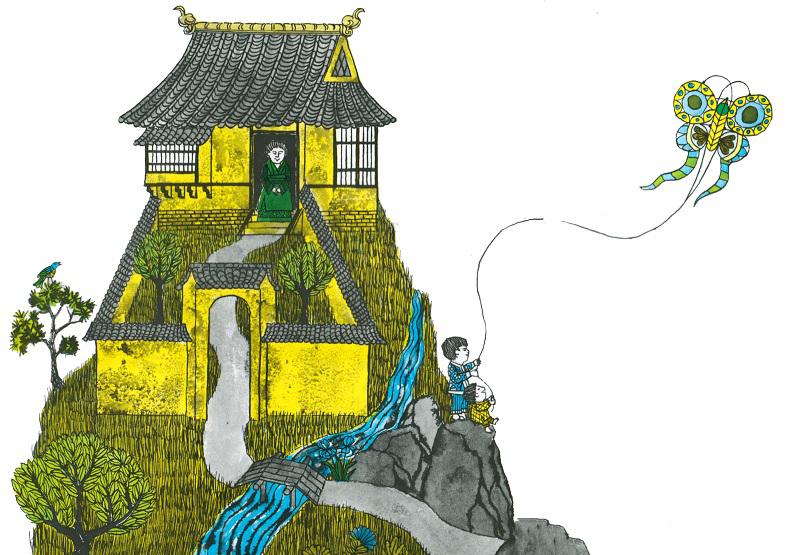Heavenly Baby and A Little: The Trouble of Long Names
This is the famous work of Arlene Mösse, author of the 1973 Caddick Book Gold Award, "The Laughing Lady who Lost the Rice Ball", the story is based on a Chinese mythological fable, is an award-winning classic picture book, won the 1968 Boston Globe Picture Book Award, one of the 50 best children's books in 50 years by the New York Times, and one of the 100 best picture books in the world by American Library Magazine.
It is said that there was a custom in ancient China that the name of the eldest son should be very long to show respect, and the name of the younger sons was not so important. So, when the elder brother Hongxi Hongfu Ruilong Baoyuan Shouqi Guangyi Hexiang Buyun Kangning Junxing and younger brother Ah Xiao fell into the well at the same time, what kind of trouble would be caused by the long name?
In the 50 years since its release, the book "Heavenly Baby and A Little" has sold more than a million copies, but when young readers hear the boy's long name, they will still smile the same way.
The reinterpretation of this ancient Chinese folk tale has brought generations of children the joy of reading, allowing them to imagine how much trouble it would be to have a long name like "Hongxi Hongfu, Ruilong, Baoyuan, Shouqi, Guangyi, Hexiang, Buyun, Kangning, Junxing".

A long time ago, Chinese parents would give their first child a particularly long, special name, and the children born later would be given a name.
In a small mountain village, there lives a mother and her two sons, the younger son is called "A Xiao", which means "the smallest and most useless child", and the name of the eldest son is like this: "Hongxi Hongfu Ruilong Baoyuan Shouqi Guangyi Hexiang Buyun Kangning Junxing", which means "Heavenly Gift Xiang dragon Ruihu Heart Liver Baby Life Root"!
One day, two little mischievous people did not listen to their mother's words, ran to the well to play, and stood on the eaves of the well, and suddenly A Xiao fell into the well!
Hongxi Hongfu, Ruilong, Baoyuan, Shouqi, Guangyi, Hexiang, Buyun, Kangning Junxing, quickly stepped on his calves, ran desperately to his mother's side, and found the ladder Abo, used the ladder to rescue A Xiao, after spitting water, inhaling, over and over again, A Xiao finally eased his breath, and jumped alive like before!
In the months since, the two children have played at the well every time, but after the Mid-Autumn Festival that day, they took the rice cake to the well to eat.
Suddenly, Hongxi Hongfu, Ruilong, Baoyuan, Shouqi, Guangyi, Hexiang, Buyun, Kangning Junxing fell into the well!
This time, Ah Xiao quickly stepped on his calves and ran desperately to his mother's side, saying: "Mother, Hongxi Hongfu Ruilong, Baoyuan, Shouqi, Guangyi, Hexiang, Buyun, Kangning Junxing fell into the well!" ”
However, his mother could not hear him clearly. Poor Ah Novel has such a long string of names, they are tired to memorize it, but the brother is still soaking in the well...
Poor Ah Xiao was overwhelmed, his brother's long list of names, could he say it again?
After such a toss, can my brother still be rescued?
About the Author:
[Beauty] Arlene Moselle, the most famous work is the 1968 creation of "Heavenly Baby and A Xiao", based on the ancient Chinese people's name length as inspiration to create a story, his "The Laughing Woman Who Lost the Rice Ball" won the Caddick Book Gold Medal in 1973.
About the Illustrator:
Blair Randt, children's book writer and illustrator, is both the illustrator of the Caddick Gold Medal work "The Laughing Woman Who Lost the Rice Ball" and the illustrator of "Heavenly Baby and A Little". He is good at using various forms, such as acrylic, paper cutting, colored lead, ink painting, etc. to express folk tales.
Translator: Fan Xiaoxing